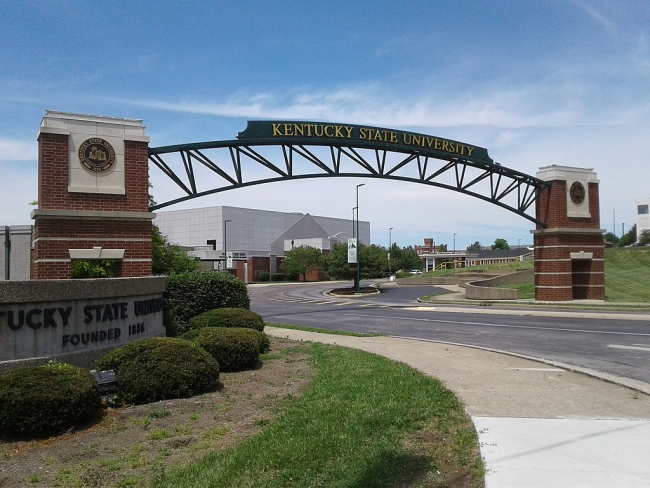You have /5 articles left.
Sign up for a free account or log in.

Kentucky State University
Normal Op/Wikimedia Commons
The president of Kentucky State University resigned Tuesday as the Board of Regents prepares to bring in an external auditor to examine institutional finances.
M. Christopher Brown II, who had been president of the university since 2017, offered his resignation during a special board meeting. The board, with two members absent, unanimously accepted.
“We anticipate a cordial, collaborative and seamless transition and wish Dr. Brown well as he follows his interest in other professional endeavors,” Elaine Farris, chair of the board, said in a written statement.
The board tapped Clara Ross Stamps, senior vice president for brand identity and university relations, to serve as acting president, effective immediately. The board will discuss a search for the university’s next president at its next meeting in September.
“As the Kentucky State University community comes together, with a renewed appreciation for our collegiate campus atmosphere and a commitment to our core mission and values, I am humbled and energized by the opportunity to serve our students and community following what has certainly been a time of unprecedented change,” Stamps said in a statement Tuesday.
The public, historically Black university in Frankfort has not publicly disclosed any information about possible financial problems, but the Board of Regents’ recent actions suggest the university is not in perfect financial health. The Lexington Herald Leader recently reported that several unnamed regents approached Kentucky governor Andy Beshear with concerns about the university’s finances.
“Administration officials have been in contact with regents and the Kentucky Council on Postsecondary Education to gather more information about the issues they have raised,” Beshear’s office said in a statement.
Beshear signed an executive order Tuesday afternoon that instructs the Council on Postsecondary Education to review Kentucky State's financial status. Following the review, the council will assist the university in "developing a management and improvement plan with goals and measurable metrics, which shall be subject to the approval of CPE," according to a press release. The council will also make recommendations to the board regarding the university's administrative structure and leadership.
Regents convened Tuesday’s special meeting to appoint an external auditor to review the university’s financial status. The institution is scheduled to begin work soon on a 500-bed residence hall, which will cost $50 million.
Brown’s abrupt resignation and news of the university’s uncertain financial health came seemingly out of the blue, said Danny Collum, a professor of English and secretary for the Faculty Senate. Faculty members had been told recently that the university was in good shape.
“It was a surprise,” he said. “What we were hearing was we’re in the black, we had no red flags on the audit, enrollment has been steady.”
The university announced in April that it received a positive financial audit for fiscal year 2020, which ended last summer amid the COVID-19 pandemic. Kentucky State, which maintains a $49 million operating budget, entered fiscal year 2021 with a $2.3 million budget surplus and a $3.5 million increase to its $18.5 million endowment, according to the audit.
“Kentucky State continues to be in sound financial position in spite of the health crisis and significant economic disruption caused by the COVID-19 outbreak,” the university’s April statement said. “From a financial perspective, Kentucky State University officials expect to be able to fully deliver all instruction and provide a robust array of services to students in the upcoming academic year despite a very challenging fiscal environment. Kentucky State’s conservative fiscal discipline over the years has resulted in healthy liquidity, ample reserves and a manageable debt burden, enabling Kentucky State to be in position to weather economic downturns.”
Brown’s most recent performance review, published by the board in January, suggested the board was happy with his performance at the time. That said, the board did give Brown several finance-related recommendations, including that he strengthen private fundraising, improve the accounts payable cycle time, develop a financial dashboard for the regents and “conduct a comprehensive review of university budget development and monitoring processes to ensure transparency, accountability, and alignment with best practices in higher education.”
Kentucky State University is the second institution where Brown has resigned from the presidency. While president of Alcorn State University in Mississippi, Brown was placed on administrative leave after receiving criticism for spending $89,000 on the presidential residence without proper bidding, the Courier-Journal reported. He stepped down shortly afterward.
Brown’s resignation has stirred doubt among the Kentucky State faculty, some of whom are now concerned about the university’s finances and preparing for the upcoming presidential search, Collum said. Employees at Kentucky State were frustrated by the search process through which Brown was hired in 2017. They were turned off by Brown’s previous resignation from Alcorn State, and many faculty members were upset that the list of finalists did not include Aaron Thompson, the well-liked interim president at the time.
“We need to know more about our university,” he said. “Is the next fiscal year going to look like the projected budget that was just approved? That’s going to be a big concern for us.”
A spokesperson for Kentucky State did not return a request for additional comment Tuesday.
The university is also battling a handful of lawsuits, several of which name Brown. One of the suits ended with Kentucky State paying a $150,000 settlement after a whistle-blower claimed Brown “improperly interfered” with the award of a dining services contract to help a losing bidder, the Courier-Journal reported. Other lawsuits allege sexual misconduct and harassment of students by Kentucky State administrators and employees, as well as misappropriation of institutional and federal funds.








